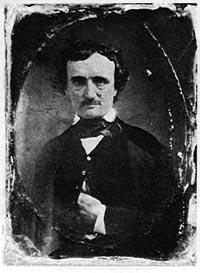Here’s the seventh installment of LiteratEye, a series found only on The Art of the Prank Blog, by W.J. Elvin III, editor and publisher of FIONA: Mysteries & Curiosities of Literary Fraud & Folly and the LitFraud blog.
LiteratEye #7: Faux Poe
By W.J. Elvin III
March 27, 2009
 This year is the 200th anniversary of the birth of Edgar Allan Poe. If you keep track of these things, you’re no doubt amazed at the creative ways people find to connect to the master of the macabre. The calendar is cluttered with related events put on by institutions, communities and individuals nationwide.
This year is the 200th anniversary of the birth of Edgar Allan Poe. If you keep track of these things, you’re no doubt amazed at the creative ways people find to connect to the master of the macabre. The calendar is cluttered with related events put on by institutions, communities and individuals nationwide.
Poe offers a goldmine of opportunities for those intrigued by literary fraud, hoaxes, mystifications and riddles. He left behind many puzzles to be solved, in his writing and in how he lived his brief life. For instance, he fought many back-and-forth battles over plagiarism, sometimes the accused and sometimes the accuser. On the other side of it, his fame made him a magnet for forgers, pranksters, satirists and others hitching a ride on his star.
In prowling old literary magazines, an avocation which no doubt fills endless hours of your leisure time, you can hardly help but notice how often others imitated Poe’s style. Digging into it, there is quite a bit of controversy over what he wrote or didn’t write, much of it unresolved. It’s confounding how many lesser lights tried to pass off their work as that of the master. And then there’s the on-going question of how many, if any, succeeded.
Possibly the most interesting known fake Poe was a poem by James Whitcomb Riley, the famous Hoosier poet, who in his younger days purposefully set out to fool critics with “Leonainie.” And fool them he did. Long after he had admitted to, and taken credit for, the hoax, “Leonainie” continued to appear as a freshly discovered poem by Poe. I’d quote a few lines for you to toss out during conversational lulls, but it really is a pathetic attempt at Poe’s eerie and hypnotic way with words. However, it did the job Riley assigned to it. Details to satisfy the most insatiable appetite may be found at jameswhitcombriley.com.
“Leonainie” was but one of a great many misattributed works. A discussion of the problem can be found at eapoe.org/works/canon/poecanon.htm, and you can scroll down to “Apocryphal, Doubtful and Rejected” to get an idea of some of the challenges faced by researchers. That collection is part of the extensive postings by the Edgar Allan Poe Society of Baltimore, well worth a visit at eapoe.org/index.htm.
Poe apparently gloried in providing false and outlandish details when asked about his life. Typical was the claim that, like Byron, he was involved in the war for Greek independence. He boasted of being captured and carted off to Russia. It’s more likely he never left the United States beyond a few years in England as a youngster, though there is a report of his presence in Paris, scene of some of his stories. His wild tales of adventure were simply masterpieces of self-promotion, gobbled up by the press of the day.
Most scholarly work appearing in connection with the anniversary of Poe’s birth seems a lot of speculative psychobabble, attempts to fix blame for his dark genius. I was happy to find a ten-year-old book that goes into “What” and “How” questions rather than the tired old “Why.” That book is “The Cryptographic Imagination” by Shawn James Rosenheim. It explores Poe’s fascination with making and breaking secret codes and shows the influence his cryptographic efforts had on modern espionage, literature, and the Internet.
Rosenheim’s book is an engaging, exciting mind-stretcher. For instance, can you offhand suggest how Poe helped bring about an early close to World War II? No doubt the book was written for the academic crowd, but, nonetheless, ordinary earthlings eager to know more about Poe will probably enjoy it.
Poe’s legacy of course includes a mysterious death, his final baffler for readers, researchers and writers yet to come. Wikipedia notes that the possible causes of his death include rabies, cholera, tuberculosis, a brain hemorrhage, diabetes, heart disease, murder, suicide, a drug overdose, or alcohol poisoning.” In other words, your guess is as good as mine.
(Copyright 2009 WJE, exclusive to The Art of the Prank, for reprint rights contact Literateye@gmail.com)
photo: EveryDayMemoir
Related posts:
